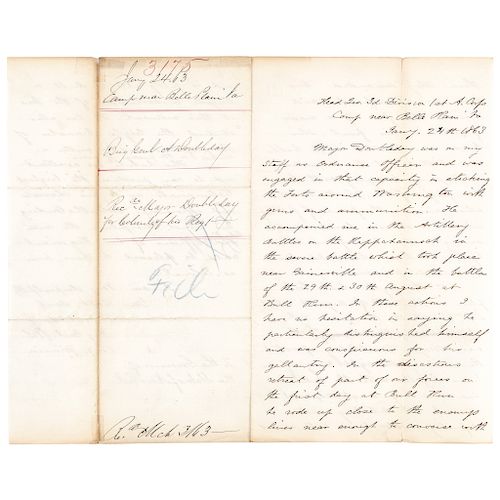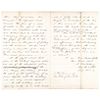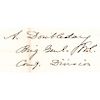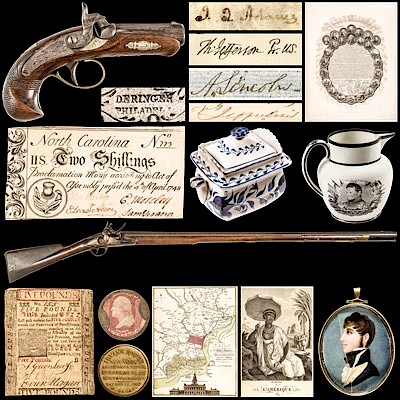1863 General ABNER DOUBLEDAYs Civil War Letter Telling of His Brothers Heroism
Lot 32
Categories
Estimate:
$3,800 - $4,800
Absentee vs Live bid
Two ways to bid:
- Leave a max absentee bid and the platform will bid on your behalf up to your maximum bid during the live auction.
- Bid live during the auction and your bids will be submitted real-time to the auctioneer.
Bid Increments
| Price | Bid Increment |
|---|---|
| $0 | $10 |
| $200 | $20 |
| $300 | $25 |
| $500 | $50 |
| $1,000 | $100 |
| $2,000 | $200 |
| $3,000 | $250 |
| $5,000 | $500 |
| $10,000 | $1,000 |
| $20,000 | $2,000 |
| $30,000 | $2,500 |
| $50,000 | $5,000 |
| $100,000 | $10,000 |
| $200,000 | $20,000 |
| $300,000 | $25,000 |
| $500,000 | $50,000 |
About Auction
By Early American History Auctions
Oct 19, 2019
Set Reminder
2019-10-19 12:00:00
2019-10-19 12:00:00
America/New_York
Bidsquare
Bidsquare : Historic Autographs-Currency-Political-Americana-Militaria-Guns
https://www.bidsquare.com/auctions/early-american-history-auctions/historic-autographs-currency-political-americana-militaria-guns-4513
326 Lots of Rare, Historic Autographs, Americana, Civil War Era, George Washington, Abraham Lincoln, Black History, Revolutionary War Era, Colonial America, Federal Period, War of 1812, Colonial Currency, Indian Peace Medals & more... Early American History Auctions auctions@earlyamerican.com
326 Lots of Rare, Historic Autographs, Americana, Civil War Era, George Washington, Abraham Lincoln, Black History, Revolutionary War Era, Colonial America, Federal Period, War of 1812, Colonial Currency, Indian Peace Medals & more... Early American History Auctions auctions@earlyamerican.com
- Lot Description
Autographs
1863 General Abner Doubleday Excellent Content Civil War Letter Describing His Brother "Ulysses" Heroism in Battle!
ABNER DOUBLEDAY (1819-1893). Civil War Union Army General. Officer at Charleston Harbor, SC. when it was attacked who aimed the First Gun, Firing the First Shot against the Confederates attacking at Fort Sumter, credited by some with Inventing the modern Game of Baseball.
January 24, 1863-Dated Civil War, wonderful content Autograph Letter Signed, "A. Doubleday" as Brigadier General, 3 pages, measuring about 5" x 8" (octavo), Choice Very Fine. Written from Headquarters, 3rd Division, 1st Army Corps, Camp Near Belle Plain, Va., and noted at its conclusion as addressed, "To the Governor of the State of New York." Here, General Abner Doubleday recommends his brother, Major Doubleday (4th N.Y. Heavy Artillery) for promotion, and further supports his request with statements of his brother Ulysses' heroic feats of military bravery and outstanding conduct. Ulysses, who was a Major, ended up resigning on March 7, 1863, to re-enter the service later that year as Colonel of the 3rd U.S. Colored Infantry. General Abner Doubleday writes, in full:
" Head Qrs. 3d. Division 1st A. Corps -- Camp near Belle Plains, Va -- Jany. 24th 1863 --
Major Doubleday was on my Staff as Ordnance officer and was engaged in that capacity in stocking the forst around Washington with guns and ammunition (at Second Battle of Bull Run). He accompanied me in the artillery battles on the Rappahannock, in the severe battle which took place near Gainesville and in the battles of the 29th & 30th August at Bull Run. In these actions I have no hesitation in saying he particularly distinguished himself and was conspicuous for his gallantry.
In the disastrous retreat of part of our forces on the first day at Bull Run he rode up close to the enemy's lines near enough to converse with them. They demanded his surrender. He refused and received the fire of a mass of rebels in his front. His horse was riddled with balls and killed but he succeeded in escaping, bringing with him two flags of the 76 N.Y. Vol. which were on the point of falling into the enemy's hands, and saving a number of our men by his exertions who would have been made prisoners.
At the fight which took place on the 28th of August which was one of the sharpest actions of the war ... Major Doubleday posted the whole of the right wing of our forces together with the artillery and was very much exposed.
In all artillery and infantry drills he is well versed and is fully able to drill a Brigade in evolutions of the line at this moment. He has also studied the higher branches of the profession, and has written a treatise on the passage of rivers.
His talents are excellent and he can produce the highest testimonials as to his character and efficiency. Notwithstanding his strict discipline the men like him and the officers of his Regiment would be pleased to have him as Colonel. -- I am Very Respectfully - Your Obedt Servt -- (Signed) A. Doubleday - Brig Genl.."
Written Docket on the back page panel reads: "3175 - Jany 24.63 - Camp near Bell Plains Va -- Brig Genl A Doubleday -- Rec ac Major Doubleday for Colonel (sic) of his Regiment"
This well penned Letter has some expected minor age tone at its edges and folds, and the main fold has a minor split at top reinforced with a small piece of clear tape. Doubleday's autograph is uncommon. It generally turning up on Non-War Date documents of little significance. A remarkable content Civil War Date Letter with excellent content as this, must be considered a great rarity of significant historic importance. The signature, "A. Doubleday" as Brig Genl. is very well written and in rich brown ink measuring over 2" long.
Abner Doubleday was a career United States Army officer and Union 2-star general in the American Civil War. He fired the first shot in defense of Fort Sumter, the opening battle of the war, and had a pivotal role in the early fighting at the Battle of Gettysburg.
Abner Doubleday was at the Charleston Harbor, SC. when it was attacked, and he supposedly aimed the first gun and firing the first shot upon the Confederates attacking at Fort Sumter. After some service in the Shenandoah, he became Brigadier of Volunteers and served at Second Manassas, Sharpsburg, and Fredericksburg. He also led the 1st Corps at Gettysburg, after Reynolds's death. He had two brothers serving in the Union Army; the one he refers to in this Letter was Ulysses, who ended up resigning on March 7, 1863, to re-enter the service later that year as Colonel of the 3rd U.S. Colored Infantry.
- Shipping Info
-
Early American provides in-house worldwide shipping. Please contact us directly if you have questions about your specific shipping requirements.
-
- Buyer's Premium



 EUR
EUR CAD
CAD AUD
AUD GBP
GBP MXN
MXN HKD
HKD CNY
CNY MYR
MYR SEK
SEK SGD
SGD CHF
CHF THB
THB













